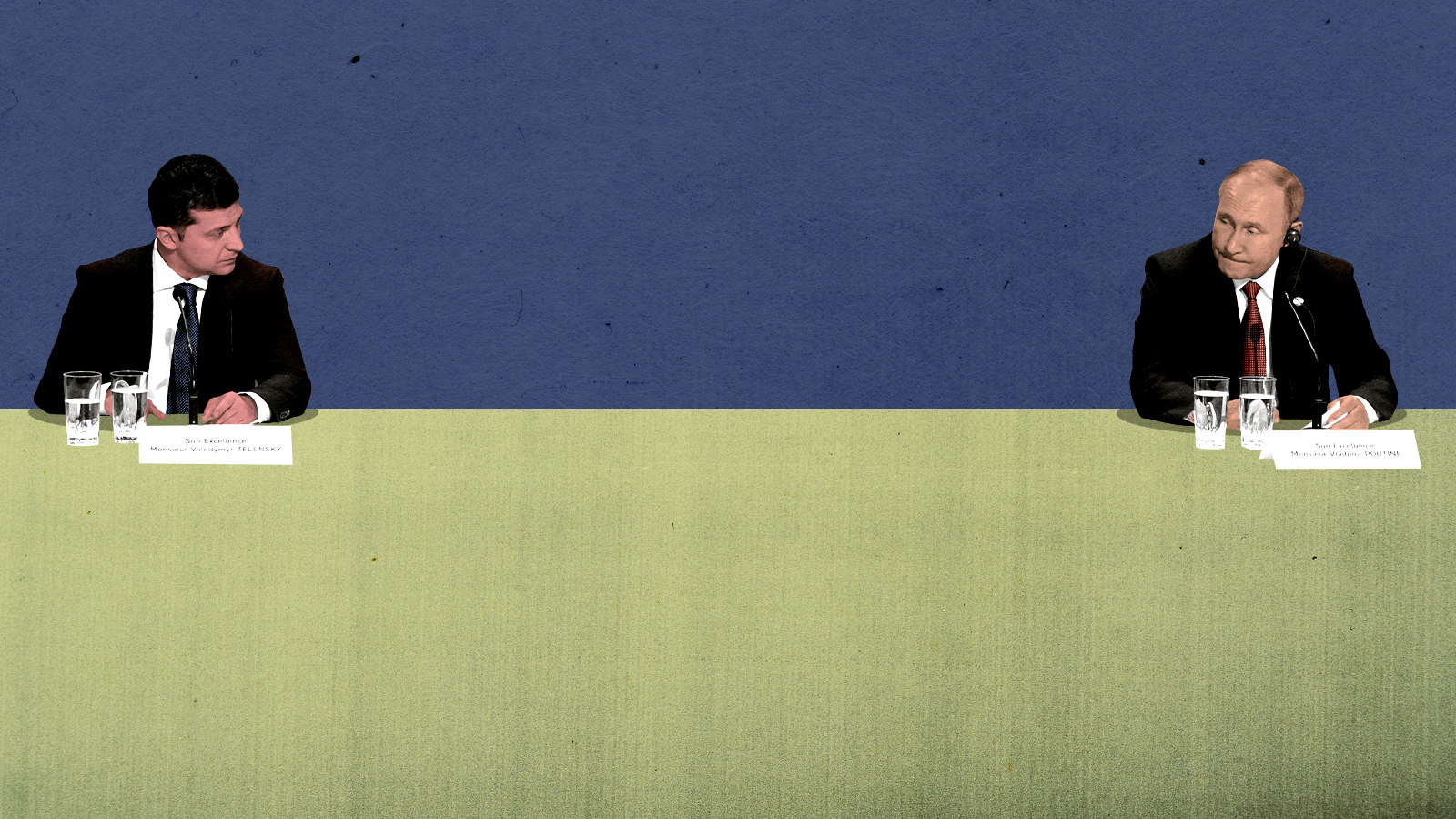Russia and Ukraine are talking, but beware the poisoned chalice


A free daily email with the biggest news stories of the day – and the best features from TheWeek.com
You are now subscribed
Your newsletter sign-up was successful
Progress appeared to be made at peace talks in Istanbul between Russian and Ukrainian officials on Tuesday. Russia vowed to reduce military activity near the Ukrainian capital of Kyiv and the northern city of Chernihiv, while Ukraine proposed a 15-year process of negotiation over the status of Crimea, which Russia invaded and annexed in 2014, and direct negotiations between Russian President Vladimir Putin and Ukrainian President Volodymyr Zelensky over the status of the Donbas, the eastern Ukrainian region that Russia believes should be an independent republic. The next step in negotiations would involve meetings between the two countries' foreign ministers, presumably to be followed by final talks between the two presidents.
While news of progress toward ending the war is encouraging, observers would be well advised to remain skeptical.
For one thing, it's far from clear that Russia has truly pulled back from Kyiv. Has the Russian military really withdrawn? Or has it merely been redeployed and gone quiet for now for the sake of permitting negotiations to proceed? Comments from U.S. officials indicate the latter.
The Week
Escape your echo chamber. Get the facts behind the news, plus analysis from multiple perspectives.

Sign up for The Week's Free Newsletters
From our morning news briefing to a weekly Good News Newsletter, get the best of The Week delivered directly to your inbox.
From our morning news briefing to a weekly Good News Newsletter, get the best of The Week delivered directly to your inbox.
Then there are reports that Ukraine would be willing to give up hopes of joining NATO and declare neutrality in return for receiving security guarantees from at least some NATO countries along the lines of the alliance's Article 5 provision (which obligates member states to come to one another's defense if attacked). But why would these other powers agree to such a guarantee when the concern over Article 5 was the primary reason Ukraine's ascension to NATO was never offered? And why would Russia agree to permit such a security guarantee when Ukraine foreswearing NATO ascension is and always has been a sticking point for Putin?
Finally, there's the prospect of direct negotiations between Putin and Zelensky. Reports that Russian oligarch Roman Abramovich and others may have been poisoned at earlier rounds of peace talks led the Ukrainian government to warn its negotiators not to eat, drink, or touch anything at meetings in Istanbul. How much greater risk will Zelensky face when and if the time comes for him to meet personally with his Russian counterpart? Is that a risk he and his country should be willing to take, given Zelensky's importance in rallying his country against Russia's invading army?
It would be good for Russia and Ukraine to find a way to bring their war to an end. But a number of formidable obstacles remain.
A free daily email with the biggest news stories of the day – and the best features from TheWeek.com
Damon Linker is a senior correspondent at TheWeek.com. He is also a former contributing editor at The New Republic and the author of The Theocons and The Religious Test.
-
 Putin’s shadow war
Putin’s shadow warFeature The Kremlin is waging a campaign of sabotage and subversion against Ukraine’s allies in the West
-
 Epstein files topple law CEO, roil UK government
Epstein files topple law CEO, roil UK governmentSpeed Read Peter Mandelson, Britain’s former ambassador to the US, is caught up in the scandal
-
 Iran and US prepare to meet after skirmishes
Iran and US prepare to meet after skirmishesSpeed Read The incident comes amid heightened tensions in the Middle East
-
 Israel retrieves final hostage’s body from Gaza
Israel retrieves final hostage’s body from GazaSpeed Read The 24-year-old police officer was killed during the initial Hamas attack
-
 China’s Xi targets top general in growing purge
China’s Xi targets top general in growing purgeSpeed Read Zhang Youxia is being investigated over ‘grave violations’ of the law
-
 Ukraine, US and Russia: do rare trilateral talks mean peace is possible?
Ukraine, US and Russia: do rare trilateral talks mean peace is possible?Rush to meet signals potential agreement but scepticism of Russian motives remain
-
 Panama and Canada are negotiating over a crucial copper mine
Panama and Canada are negotiating over a crucial copper mineIn the Spotlight Panama is set to make a final decision on the mine this summer
-
 The rise of the spymaster: a ‘tectonic shift’ in Ukraine’s politics
The rise of the spymaster: a ‘tectonic shift’ in Ukraine’s politicsIn the Spotlight President Zelenskyy’s new chief of staff, former head of military intelligence Kyrylo Budanov, is widely viewed as a potential successor



